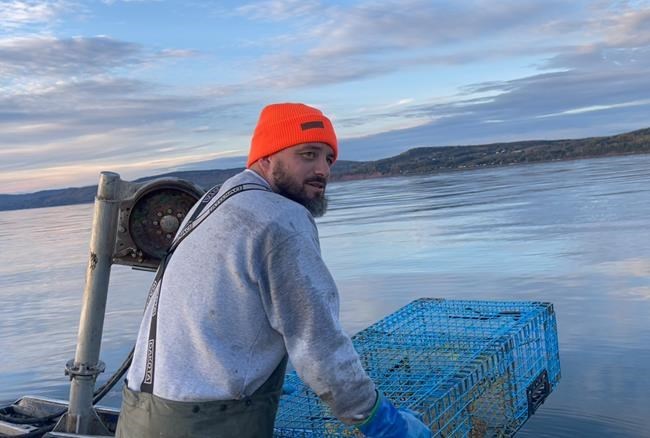CAMPBELLTON, N.B. — A judge in northern New Brunswick granted a stay of proceedings Thursday in the trial of an Indigenous lobster fisherman who recently launched a constitutional challenge aimed at asserting Indigenous and treaty rights.
Cody Caplin, a member of the Eel River Bar First Nation, was fishing for lobster in the Bay of Chaleur in September 2018 when he was arrested by federal fisheries officers. He was charged a year later with 10 offences, including trapping lobster out of season.
When his provincial court trial in Campbellton, N.B., began in November of last year, Caplin cited the Peace and Friendship Treaties signed by the Mi'kmaq and the British Crown in the 1700s, which recognize the Indigenous right to hunt and fish for personal subsistence.
As the case resumed Thursday after a lengthy adjournment, a Crown lawyer told the judge that the federal attorney general had ordered a stay of proceedings because the prosecutor handling the case was ill, leading to excessive delays.
Judge Donald LeBlanc granted the stay, saying federal Attorney General Arif Virani has the right to reopen the case within a year, but LeBlanc said he understood from the Crown that was unlikely to happen.
Caplin, however, later confirmed that his legal troubles were far from over.
He said the federal Fisheries Department came forward Thursday to say he is now facing two other charges for allegedly fishing for lobster out of season on Chaleur Bay on Sept. 3, 2020. Caplin is scheduled to return to Campbellton provincial court on Sept. 9, and his trial is expected to begin on Nov. 26.Â
Caplin said he was happy about the stay, but that emotion was muted by the new charges.
"I have no idea how they're going to get that to stick," he said in an interview Thursday. "It was 2020 and it's now 2024. They're just throwing crap at the wall and hoping it sticks ... it's pretty disappointing after a five-year battle."
Caplin said he believes federal authorities are trying to discourage him from pressing ahead with his constitutional case.Â
"We're not going to give up," he said, adding that he is being supported by Micmac Rights Association and Del Riley, the former head of the National Indian Brotherhood, which Riley helped transform into the Assembly of First Nations in the early 1980s.
"I don't care if it drains every penny out of my bank account," Caplin said. "I'm going to keep fighting .... I'll think of it as an investment in my future."
Wayne MacKay, a professor emeritus of law at Dalhousie University in Halifax, has said Caplin's case and others like it are important because they are raising questions about Ottawa's commitment to reconciliation with Canada's Indigenous population.
During his court appearance in November, Caplin told the court that the treaties in question clearly state Indigenous people retained their right to hunt and fish for subsistence. He said a treaty from 1752 says, "It is agreed that the said Tribe of Indians shall not be hindered from, but have free liberty of hunting and fishing as usual."Â
The Caplin case is similar to others in the Maritimes. The Fisheries Department confirmed in October that 54 Mi'kmaq harvesters were facing fisheries-related charges in Nova Scotia. At the time, about half of them said they were planning their own constitutional challenges, though several have since given up.
This report by The Canadian Press was first published Feb. 15, 2024.
The Canadian Press
Note to readers: This is a corrected story. An earlier version stated that Cody Caplin was expected to rely on the Supreme Court of Canada's 1990 decision regarding Ronald Sparrow. A spokesman for Caplin says Caplin had planned to make other arguments.



